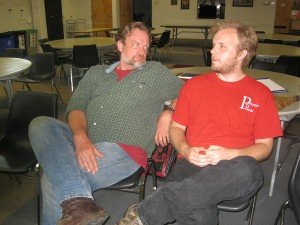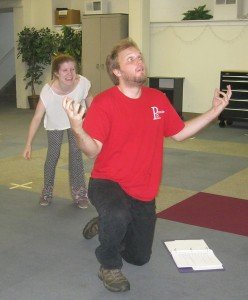Article and photos by JAN WILLMS
Dinosaurs, Roman centurions, and Shakespeare are all a part of Longfellow resident Dylan Ward’s play “An Autistic Life Through History,” scheduled at the Minnesota Fringe.
Photo left: The play is being shown at the Minneapolis Theater Garage at 711 W. Franklin Ave. The schedule is July 31 at 10pm; Aug. 3 at 5:30pm; Aug. 5 at 7pm; Aug. 7 at 10pm; and Aug. 8 at 1pm.
“The show merges the aspects of a human being who is autistic,” said Ward. “It takes his life from the beginning to getting to a certain point, describing his interests, what he loves, what has made him happy and what he would like to focus on.”
The main character of the play, Thomas, imagines that he is becoming a legionnaire in the Roman army when seeking a job.
“Because every corporation is in some way a kind of empire with the ultimate financial power, Thomas parallels this with the Romans having great military power at the time,” Ward explained.
Ward, diagnosed with autism at an early age, said the character of Thomas is a mirror reflection of himself. “I would always try to do the right thing, and Thomas always tries to do the right thing,” he said. “I am also excited about doing things and going on new adventures and trying to find my way in the world, just like Thomas. The difference is that I live in a world that was formed by other forces. Thomas is an emotional and mental aspect of me, the aspect of me that is out to achieve and go out and find his own way.”
Ward said Thomas’ world is built by the imaginations and the perspectives of others.
“Essentially, it is as if your common interest, and the things you would be fascinated by, would shape the world around you.”
Recalling his adolescent years, Ward, now 24, said that if you loved dinosaurs a lot during childhood, you were a dinosaur. “It’s not that you play with dinosaurs, you are one yourself. And in high school, it’s not that you just read books about the Ice Age, you are actually going to school in the Ice Age. When you find a job, and it may be dressing up like a Roman to promote a pizza shop, you are actually a Roman fighting barbarians.”
Describing the play, Ward said the big difference between himself and Thomas is that Thomas is a fighter, and he is not. “Thomas finds himself in situations where he would go into combat. I, on the other hand, have always lived in a world that isn’t that crazy, it isn’t that strange. But in the way that Thomas always has to fight, I would have to fight inside. How I would react to other situations and how my autism would manifest itself in my behavior,” Ward said.
“My imagination is pretty much the most powerful aspect of me,” he continued. “I can’t really find myself going anywhere in life without it. Most people’s imaginations are like little conveniences, like medications that they use to calm down. But my imagination tries to trigger what’s going on with me.”
As examples, Ward described that as a kid if someone was trying to bully him, it would be like a T-Rex was trying to eat him for lunch. When he was going through the hassles of high school, he would feel like a caveman going out to kill a mastodon. Or with the hassles of a job, he would imagine himself as a legionnaire fighting in the Roman army.
David Ward, Dylan’s father who is directing the play, interjected. “Dylan’s imagination draws parallels that make it easier for him to cope emotionally with a situation he might be unfamiliar with, and that describes the basic structure of the play.”
 Photo right: David Ward (left) is Dylan's father, and also director of the play.
Photo right: David Ward (left) is Dylan's father, and also director of the play.
“He starts out as a dinosaur, and then passes through to a caveman and then to the Renaissance. He meets a young woman, and they have been in a relationship throughout the ages they have passed through. They’ve kind of forgotten about each other. And then his character becomes an artist and an actor, which is also similar to what Dylan did.”
Dylan said he decided to write a play for the Fringe back in November. “I was writing a play for myself, something I would want to read and want to act in,” he noted. “For the past four years I had wanted to write a show that I could put on with friends and family—a show that would reflect a certain psychological and emotional aspect of me. I tried to figure out what that show was, and I wrote a lot of crappy, pointless and unfocused scripts. Some of them were ten pages, some were 40, but none of them could strike the right note until November.”
He said he had always been into dinosaurs, the Ice Age, Romans and Shakespeare. Then he looked at the focal points in his life: bullies, finding his way, finding a relationship, doing theater. “These things began to merge, and my imagination always paralleled the two, and that’s when I was able to write it out. I wrote it in two nights, and I had it read at the Playwright Center.”
Dylan said he also had friends and family read it, and everybody loved it. “The Fringe was coming just around the corner and I figured ‘What the heck? I’ll take a shot.’”
Dylan said the most difficult part right now is the production itself and making sure everything is together when needed for the festival, which he described as a big, chaotic event. “We only get one tech rehearsal for three hours, so we have to have everything in place by the time that happens.”
Besides himself in the role of Thomas, four other actors perform in the play. They are Abigail Swoop, Ben Farrey-Lutz, Jane Steiner and Brian Coffin. Dylan’s mom, Faye, is creating costumes.
 Photo left: Abigail Swoop and Dylan Ward rehearse a scene from Ward’s play, “An Autistic Life Through History.” Dinosaurs, Roman centurions, and Shakespeare are all a part of Longfellow resident Dylan Ward’s play.
Photo left: Abigail Swoop and Dylan Ward rehearse a scene from Ward’s play, “An Autistic Life Through History.” Dinosaurs, Roman centurions, and Shakespeare are all a part of Longfellow resident Dylan Ward’s play.
“Because my dad’s directing and my mom’s making costumes, if I had a great job out in San Francisco, I would turn it down for this show,” Dylan said. “That’s kind of reckless, but I can’t bring myself to waste this chance.”
Dylan’s parents have a history in the theater, both in Chicago and Minneapolis. “This is the first show I’ve directed in several years, so I’m a little rusty,” David admitted, “but everyone is very patient.”
He said that he got out of theater for a little while when both Dylan and his younger brother, Sean, were diagnosed with autism. Dylan did not speak until age 3, and he was 5 when he first voiced an opinion rather than repeat what someone else had said.
“We were driving, and we almost wrecked the car when he spoke up,” David recalled. He said that as Dylan grew, he benefited from some excellent teachers. He graduated from South High, attended Minneapolis Community and Technical College and is getting ready to take some classes at Metro State.
“Every year his cognitive abilities, his abilities to communicate and to understand the world just improved,” David said. “It’s a nice success story, but a lot of it is Dylan himself.”
Regarding the play, David said he does not think of it as about autism itself. “The word autism is only mentioned at the beginning and the very end. It’s a trip through the imagination of an autistic person, but autism isn’t a major factor. It’s sort of a framework.”
“My motivation for writing this play, and for keeping the autism theme abstract, is because I want to put a different kind of angle and perspective on autism awareness,” added Dylan. “I feel the best way, and what the autism awareness effort needs the most, is to see the magic and the power and the value that an autistic imagination would have.”
The play is being shown at the Minneapolis Theater Garage at 711 W. Franklin Ave. The schedule is July 31 at 10pm; Aug. 3 at 5:30pm; Aug. 5 at 7pm; Aug. 7 at 10pm; and Aug. 8 at 1pm.
Comments
No comments on this item Please log in to comment by clicking here